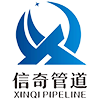AWWA C207 actually refers to the C207 standard developed by the American Water Works Association (AWWA). It is a standard specification for pipe flanges for water supply, drainage, and other liquid transport systems.
Flange type:
The AWWA C207 standard covers different types of flanges, including blind flanges, weld neck flanges, slip on flanges, threaded flanges, etc. Each type of flange has its specific application scenarios and uses.
Pressure Level:
The AWWA C207 standard defines flanges with different pressure classes. The common pressure ratings are Class B, Class D, Class E and Class F. Each grade corresponds to different pressure and temperature requirements to meet various engineering needs.
Size range:
The AWWA C207 standard specifies a range of flange diameters in different sizes, from 4 inches to 72 inches. That is, DN100-DN1800, which means that the standard is suitable for connections and applications of various pipe diameters.
Standard range:
AWWA C207 mainly involves standards for pipeline flanges, including flanges made of carbon steel, stainless steel, and alloy steel. It is suitable for a wide variety of piping systems in the utility, industrial, commercial and construction sectors.
International recognition:
Although AWWA is a US-based organization, the AWWA C207 standard is widely used worldwide and is widely accepted and recognized. This standard is adopted in water supply projects, drainage systems and liquid transportation systems in many countries and regions.
AWWA C207 is the standard used for pipe flanges and it has both advantages and disadvantages.
Advantage:
1. Standardization: AWWA C207 provides standardized design and manufacturing requirements for pipeline flanges, so that different manufacturers and suppliers can follow the same specifications for production, thereby ensuring product quality and consistency.
2. Wide range of application: This standard is applicable to flanges made of various materials, including steel, cast iron, alloy steel and stainless steel, etc., to meet different engineering needs.
3. Various pressure levels: AWWA C207 covers flanges with various pressure levels, allowing engineers to choose the appropriate flange type and pressure level according to the needs of specific projects.
4. Reliability: Flanges conforming to AWWA C207 standard have undergone strict design and testing requirements, have high reliability and durability, and help to ensure the safe and stable operation of the pipeline system.
Disadvantanges:
1. Earlier standards: AWWA C207 is an earlier standard and may not fully comply with the latest technical and engineering requirements in some respects. As technology continues to evolve, some new materials and designs may not be adequately covered by this standard.
2. Not applicable in all cases: Although AWWA C207 is suitable for pipe flanges in most cases, other more stringent standards may be required for some special engineering projects or specific material requirements.
3. Slow update speed: The standard update process may be relatively slow, resulting in some new technologies and best practices not being included in the standard in time, making the standard slow to keep pace with the times.
Taken together, AWWA C207 is valid in most cases as an industry standard, providing a solid set of design and manufacturing guidelines that help ensure the quality and performance of pipe flanges. However, in practical applications, engineers and designers need to comprehensively consider the needs of specific projects, and if necessary, refer to other latest standards and best practices to meet specific requirements.
Post time: Aug-03-2023




